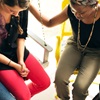I read through the small group covenant as I had done countless times before. I like to revisit the purpose of our small group and restate the need for commitment and confidentiality every time we begin a new study. I expected this time would be no different than the others, when agreement with the covenant was unanimous. As I finished reading the last point, I asked the group as I usually do, "Is everyone okay with this?" I reached for the day's lesson, assuming we would be moving on, when I heard a fairly new group member say, "No, that doesn't work for me." Shocked, I looked up to see her emotionless face as she continued. "I can't say I can commit to this group," she aggressively stated, "I'm in three other Bible studies and sometimes I won't feel like going to them all."
The discussion drifted from our topic when a young man mentioned Satan. Several others chimed in with their own stories of the devil's evil tactics to get them off track and lose sight of God's will for their lives. The lively conversation continued until a woman broke through the chatter with the words, "I don't believe in the devil." The discussion came to a halt and all comments were replaced by an abrupt silence. Our small group leader looked like she was trying to piece together a response when another woman boldly said, "No wonder you don't believe in the devil—he lives at my house." The group roared with laughter.
As the members of our small group discussed the book of Ephesians, two of the men disagreed with each other's interpretation of chapter 5, verses 25-27, "Husbands, love your wives, just as Christ loved the church and gave himself up for her to make her holy, cleansing her by the washing with water through the word, and to present her to himself as a radiant church, without stain or wrinkle or any other blemish, but holy and blameless" (NIV). Jim attempted to stress the importance of a man's spiritual role in the health of his wife. But Ken, whose wife suffers with multiple personality disorder, disagreed. Jim was not criticizing Ken; he just wanted to offer his perspective. Ken became angry and threatened to leave the meeting if Jim said one more word. Jim attempted to clarify himself once more and Ken was gone. He grabbed his jacket and ran out the front door. His wife stared in the direction of his exit and began to weep. Jim looked around and apologized to the group.
Conflict in a small groups cannot be avoided. People come to our groups with emotional bundles filled with intense experiences, horrific hurts, and less-than-perfect interpretations. When we choose to unpack these personal packages in front of others, conflict is often near at hand. Ironically, that is exactly where God likes to work on us. Small groups should provide an environment that welcomes members to unpack their not-so-pretty thoughts, feelings, and memories. However, handling conflict as a small group leader can be, at times, an overwhelming task. When conflict arises in your group, consider the following:
Comment—Do not let conflict be swept under the rug. Take time to talk about what is happening and ask for input. Earnestly listen to each person's thoughts, direct the group towards God's Word, and spend some time in prayer. As the small group leader, I handled the first incident above by opening a discussion about the covenant and the importance of each of its parts. Everyone shared their thoughts and lovingly supported the woman's need to disagree. We ended with prayer, asking God's blessing on her and the other Bible studies she was attending. We parted ways by agreeing on the simplest and most powerful truth of all—Jesus loves each one of us.
Confront—When a group member says something that clearly does not line up with God's Word, respectfully confront the issue immediately. In the second incident above, our small group leader commented that the Bible makes it very clear that we have an enemy that seeks to kill and destroy. She warmly asked if she could visit with the young woman the next day over coffee and then moved on with the lesson. She was right to confront the issue right then because, left alone, it could cause doubt and uncertainty in less spiritually mature members.
Comfort—Remember God loves each one of us right where we are. Disagreements should not lead to the destruction of relationships. Conversely, they should strengthen our bond. When Ken ran out of the house that night, we abandoned the lesson to surround his wife with encouragement, worship, and prayer. We prayed for Ken's safety. Nearly an hour later, Ken walked back through the door and sat humbly on the couch. Through tears, he asked Jim to forgive him then let the pain of many years pour from his heart. As a group, we were blessed to witness God's powerful grace and privileged to comfort those He loves.
Embrace conflict in your small group by bravely walking through its wide-open doors of opportunity and witnessing the beautiful grace and mighty strength of God as He changes lives.









